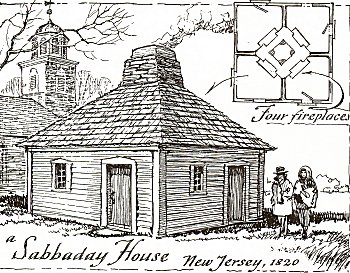
![]()
The early 1800s church has beeen condemned as embodying too much "hell fire andbrimstone," but those who criticize forget that everything was done with more zest in the olden days. When Sunday came and the meeting house became a church, the preacher forgot all business and politics of the week and became an ardent revivalist. There were few quiet preachers. As a matter of fact, if you want to imitate an actor, preacher, salesman, or other character who might have lived a century ago, you can get the proper effect by simply putting your everything into your act. In modern parlane, this is known as "overdoing it."
The earliest colonial church services were solemn and quiet, much like a court of law. Both incidentally, were announced by a roll of drums. But when church bells and organs were installed, nineteenth-century sensationalism found expression even in the church. Revival meetings were particularly noisy, and when the national anthem was sung, drums and bells and even guns usually accompanied the singing.
Theodore Roosevelt said the greatest thing he learned in school was to "do one thing at a time, and to concentrate on it." When great-grandfather removed his hat for a lady, he really put his heart into it, and the lady loved it. When the old-time minister preached, he really "went to town," and great-grandfather heartily approved.
The first churches were considered to be the main support in the structure of America life. An old New England name for the summer beam--the strongest beam of the house--was the "church beam." It was this now-waning importance that the colonists gave the church.
Today when you ask an average person why he or she goes to church, the answer would probably be, "To gain something." But when you ask what they expect to gain, they grope for an answer. The early church goers did not go to church expecting to gain, anything more than they already had; they went there to give thanks for it.
Excerpted by Maury Tosi
From Eric Sloane's booklet American Yesterday (1956)